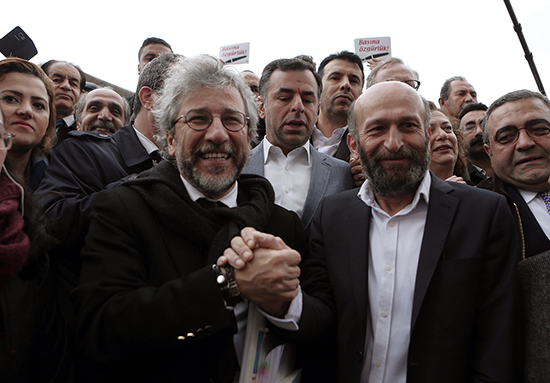Istanbul, March 25, 2016 – The Committee to Protect Journalists condemns an Istanbul court’s decision to bar the public from the trial of Can Dündar and Erdem Gül, journalists for the daily newspaper Cumhuriyet. Representatives from CPJ and other press freedom groups attended the first session of the trial today.
Dündar and Gül, Cumhuriyet‘s editor and Ankara bureau chief, respectively, face multiple life sentences if convicted of charges of disclosing state secrets, espionage, and aiding a terrorist group in connection with a May 2015 report alleging Turkey’s intelligence service sought to send weapons to Syrian opposition groups. Judge Bülent Dalkıran, presiding over Istanbul’s 14th Court for Serious Crimes, today granted prosecutors’ request to hold the rest of the trial behind closed doors, on the grounds that state secrets would be discussed. Defense lawyers had argued that this would contravene the journalists’ right to a fair trial, and asked that the press and the public be barred only from sessions when state secrets would be discussed.
“The real crime here is putting journalists Can Dündar and Erdem Gül on trial, a crime authorities want to keep hidden in the shadows, away from public scrutiny,” CPJ Europe and Central Asia Program Coordinator Nina Ognianova said from the courthouse. “Rather than becoming an accomplice to this violation of the journalists’ constitutional and fundamental human rights, the court should immediately throw out this case.”
Hundreds of supporters greeted the journalists as they arrived at the courtroom today, chanting, “You will not silence press freedom,” according to wire reports.
“We are here to defend journalism,” Dundar told reporters. “We will defend journalism and the right of the public to be told the truth.”
Judge Dalkıran also granted the prosecution’s request to add Turkish President Recep Tayyip Erdoğan and the Turkish National Intelligence agency (MİT) as complainants in the case. Defense lawyers had argued that the two had suffered no harm, that Erdoğan had demonstrated his personal hostility to the journalists, and that his involvement, as president, could be seen as meddling in the judicial process.
After a group of opposition lawmakers refused to leave the courtroom when the judge asked the public to depart, the judge refused to continue the session, and adjourned the trial until April 1, according to press reports.
“They did not want this trial to be monitored and ordered a closed session. They will probably try to hide this trial from public opinion. They will not want our defense to be heard,” Dündar told a reporter from Cumhuriyet after the session, adding that authorities did not want the evidence that informed the newspaper’s reporting “to see the light of day.”
The two journalists were released from Istanbul’s Silivri Prison on February 26, after 92 days in pre-trial detention, following a ruling from the Turkish Constitutional Court that their arrest violated their rights to liberty, security, and the constitution’s protections of press freedom. Asked about the journalists’ release, Turkish President Recep Tayyip Erdoğan on February 28 told journalists he would not “obey or respect the [Constitutional Court’s] decision.”
In a separate development, Istanbul’s 44th Court of First Instance on Thursday sentenced Bülent Keneş, the founding editor the daily newspaper Today’s Zaman, to two years and seven months in prison on charges he insulted Erdoğan. Keneş was not present at the hearing. He was not immediately available for comment.
On March 4, 2016, police raided the offices of Feza media group — which owns Today’s Zaman, Zaman, and the Cihan news agency — following a court’s order appointing new trustees for the group. The group yesterday said it would stop distributing four of its other titles to subscribers, though the newspapers would still be available at newsstands, according to press reports.
EDITOR’S NOTE: This news alert has been updated to add that the trial was adjourned to April 1, to include Dündar’s remarks after the hearing, and to include a court’s sentencing, in absentia, of Bülent Keneş.
